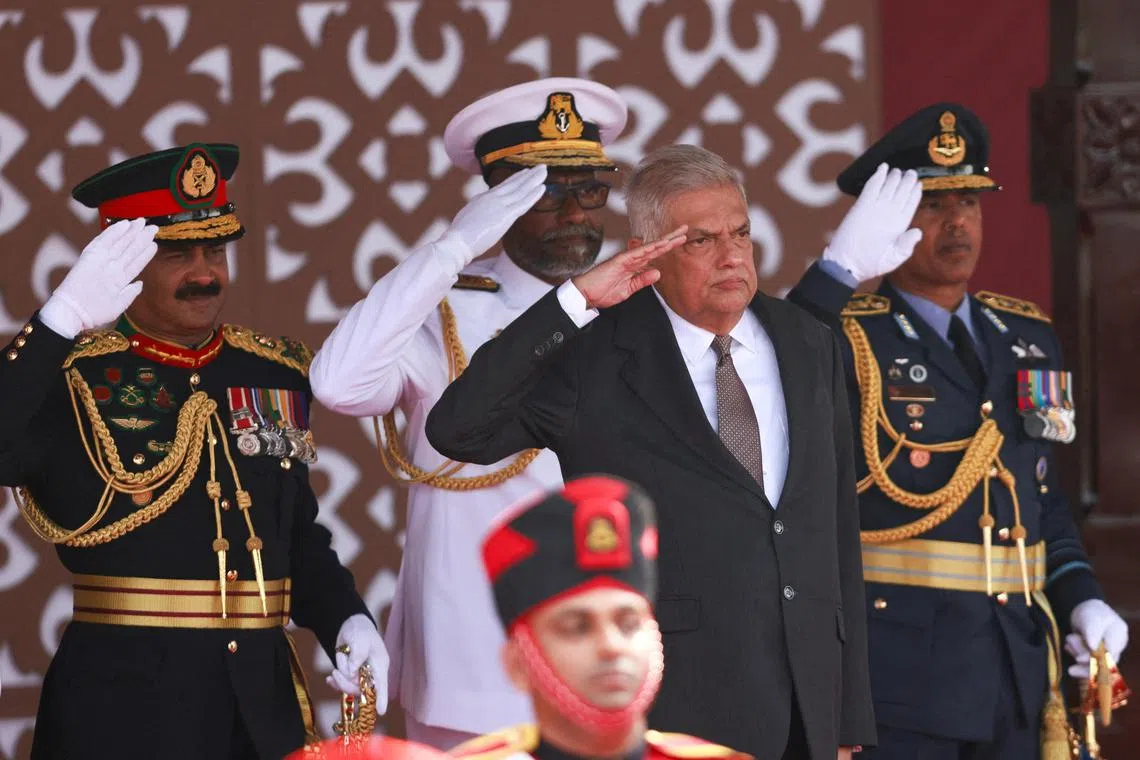Sri Lanka to elect new president Sept 21 amid critical economic reforms
Sign up now: Get insights on Asia's fast-moving developments

Sri Lankan President Ranil Wickremesinghe is widely expected to run in the election.
PHOTO: REUTERS
COLOMBO – Sri Lanka will hold a presidential election on Sept 21, a government notice said on July 26, setting the date for a crucial vote expected to determine the future of reforms in the South Asian nation weathering its worst financial crisis in decades.
Nominations for the election have to be submitted on Aug 15, with incumbent President Ranil Wickremesinghe becoming the first candidate to do so by paying a non-refundable deposit to the election commission, his office said.
Mr Wickremesinghe, 75, took office in July 2022 after widespread protests caused by the debilitating financial crisis forced his predecessor Gotabaya Rajapaksa to flee the country and later resign.
Parliament elected Mr Wickremesinghe to serve out the rest of the five year-term vacated by Mr Rajapaksa, who was elected in November 2019.
“This is a critical time for Sri Lanka,” said Ms Bhavani Fonseka, senior researcher for the Colombo-based Centre for Policy Alternatives.
“An election being called is extremely important for democracy, but now the election commission must be allowed to do what they are mandated to do. Having a free and fair election is essential.”
Almost 17 million of Sri Lanka’s 22 million population are eligible to vote in the polls.
Helped by a US$2.9 billion (S$3.9 billion) International Monetary Fund (IMF) bailout programme,
Sri Lanka’s economy is expected to grow 3 per cent in 2024 after shrinking 2.3 per cent in 2023 and 7.3 per cent during the height of the crisis.
Bilateral creditors, including Japan, China and India, signed up to a US$10 billion debt rework in June, which gave Colombo breathing space to defer repayments for four years and save US$5 billion.
But Sri Lanka still has to put the finishing touches on a preliminary agreement with bondholders on restructuring US$12.5 billion of debt ahead of a third IMF review later in 2024.
Higher taxes imposed under the IMF programme, prolonged inflation and a stagnant job market caused by the grinding crisis has plunged a quarter of the population into poverty and pushed thousands to migrate.
Opposition leader Sajith Premadasa and parliamentarian Anura Kumara Dissanayake – who heads the Marxist-leaning Janatha Vimukthi Peramuna – are expected to tap this discontent as they make their presidential bids.
Both Mr Premadasa and Mr Dissanayake have publicly said they will look at revamping the IMF programme to reduce the cost of living pressures on Sri Lankans and ease the country’s debt repayment burden.
Sri Lanka’s recovery is still very fragile and attempts to reverse the reforms could precipitate a new crisis, analysts say. The new government will need to ensure the reforms are taken forward and concluded to transform the economy and put it on a positive track, they say.
“What we require from this election is for the progress we have seen to continue,” said Mr Raynal Wickremeratne, co-head of research at Softlogic Stockbrokers. “Sri Lanka is not in a position to attempt trial and error.” REUTERS


